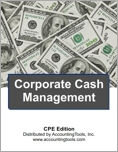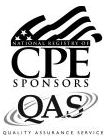Corporate Cash Management (CPE Course)
CPE Credit: 15 hours
Course Type: Downloaded PDF materials with online test
Price (with PDF Textbook): $100
Course Description
The proper management of cash is an essential part of business operations. Corporate Cash Management provides an essential framework for the development and operation of a cash management system. It does so by showing how to forecast cash flows, which can then be used as the basis for a campaign to enhance the inflow of cash to the organization. The course also notes the systems used to collect, concentrate, invest, and disburse cash, as well as the supporting controls and measurements needed to monitor these systems. It also covers the related topics of fundraising and risk management. In short, Corporate Cash Management is a useful tool for developing a comprehensive system of cash management.
Author: Steven Bragg
Course Number: FN1003
Table of Contents
Chapter 1. Introduction to Cash Management
Chapter 2. The Cash Forecast
Chapter 3. The Bank Reconciliation
Chapter 4. Cash Management Information Requirements
Chapter 5. Cash Receipts
Chapter 6. Cash Concentration Systems
Chapter 7. Types of Payments
Chapter 8. Working Capital Enhancements
Chapter 9. Investment Alternatives
Chapter 10. Debt and Equity Funding
Chapter 11. Credit Rating Agencies
Chapter 12. Clearing and Settlement Systems
Chapter 13. Foreign Exchange
Chapter 14. Interest Rates
Chapter 15. Cash Management Controls
Chapter 16. Cash Management Metrics
Learning Objectives
Identify the key cash management tasks and who is responsible for them.
Specify the sources and reliability of information used in cash forecasts.
State the formats and uses of the bank reconciliation, as well as the types of differences that may arise.
Cite the information requirements of a cash management system, and the frequency with which this information must be collected.
Specify the requirements for counterparty risk tracking.
Identify the control issues associated with cash management systems.
Recognize the methods available for collecting and processing cash receipts.
Specify the features of the main cash concentration systems, and the situations in which they should be used.
State the characteristics of the different methods of payment, and when they should be used.
Specify how positive pay and its variations can be used.
Recognize the techniques that can be used to reduce the investment in working capital.
Cite the more common cash investment strategies and investment instruments, and the circumstances under which they should be used.
Describe the accounting for investment transactions.
Recognize the role of agency financing entities, such as the Ex-Im Bank.
Specify the types of debt funding and the major stock sale exemptions, as well as restrictions on their use.
Identify the requirements for being classified as an accredited investor.
Identify the main credit rating agencies and the types of credit ratings.
State the features of and differences between the different clearing and settlement systems.
Recognize the role of a correspondent bank.
Identify the main aspects of foreign exchange risk and the methods available to mitigate it.
Specify the impact of netting on hedging activity.
Identify the main aspects of interest rate risk and the methods available to mitigate it.
Cite the controls that can be used for the cash management function.
Specify the areas in which cash management metrics should be employed, as well as how to calculate the key metrics.
Level: Overview
Instructional Method: QAS Self-Study
NASBA Category: Management Services
Prerequisites: None
Advance Preparation: None
Latest Review Date: May 2023
Program Registration Requirements: Click on "Purchase Course" near the top of this page to pay for and access the course. You will then be able to download the course as a PDF file, then take an on-line examination, and then download a certificate of completion if you pass the examination.
Program Refund Policy: For more information regarding administrative policies concerning complaints, refunds, and other matters, see our policies page.
AccountingTools, Inc. is registered with the National Association of State Boards of Accountancy (NASBA) as a sponsor of continuing professional education on the National Registry of CPE Sponsors. State boards of accountancy have the final authority on the acceptance of individual courses for CPE credit. Complaints regarding registered sponsors may be submitted to the National Registry of CPE Sponsors through its website: www.nasbaregistry.org.
The NASBA sponsor identification number for Accountingtools, Inc. is 115881.
AccountingTools is an IRS Approved Continuing Education Provider. We are compliant with the requirements for continuing education providers (as described in sections 10.6 and 10.9 of the Department of Treasury’s Circular No. 230 and in other IRS guidance, forms, and instructions). Our IRS Approved Continuing Education Provider number is 72821.


